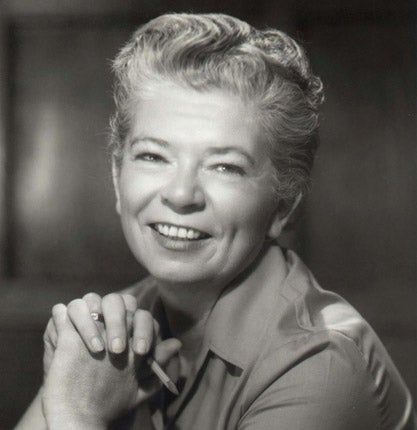Invisible Ink: No 77 - Charlotte Armstrong

Charlotte Armstrong was born in the iron-mining territory of Vulcan, Michigan, in 1905, and worked in the classified ads department of The New York Times before hitting her stride as a playwright and mystery writer. She adopted a second identity, Jo Valentine, and produced some 33 novels, hardly any of which are now in print.
She wrote for the TV show Alfred Hitchcock Presents and Hitchcock personally directed one of her stories. It's not hard to see why he chose to do so. Armstrong wrote a very specific kind of mystery – the suspense novel. Good examples are rare now, despite what publisher blurbs may promise, but I found one Armstrong in a secondhand shop that really lived up to its name.
Mischief was written in 1951, and is a novel that unfolds in "real time", a one-sitting read that ratchets up a feverish level of tension by watching a single situation unfold. Ruth and Peter are staying overnight at a big city hotel with their daughter, nine-year-old Bunny. Peter is in town to make an after-dinner speech, but at the last minute, they are forced to find a new babysitter. The liftman seems trustworthy, and offers the services of Nell, a girl he knows, so the couple go off to dinner leaving their daughter in her hands. However, the liftman suspects something about blank-eyed Nell that her employers don't know – she burned down her family home with her parents still inside.
When Nell loses her temper and is seen risking the child's life at a window, several hotel guests attempt to voice their concerns, but a series of miscommunications and complications merely serves to raise the stakes. This kind of simple idea, produced in bravura style, was once a mainstay of popular US fiction, and such authors as Ryan David Jahn and Deon Meyer are currently bringing about its return.
Mischief became a film called Don't Bother To Knock, and France's answer to Hitchcock, Claude Chabrol, directed two features from Armstrong's novels. Merci pour Le Chocolat starred Isabelle Huppert as a poisoner with unguessable motives, while La Rupture had Stephane Audran as the victim in a murderous family drama.
Armstrong understood the motivation of her damaged characters, and drew suspense by crossing their paths with innocents. Her writing style exerts the same kind of grip that Ira Levin always managed so effortlessly, and she deserves to be republished. She died in 1969.
Subscribe to Independent Premium to bookmark this article
Want to bookmark your favourite articles and stories to read or reference later? Start your Independent Premium subscription today.

Join our commenting forum
Join thought-provoking conversations, follow other Independent readers and see their replies